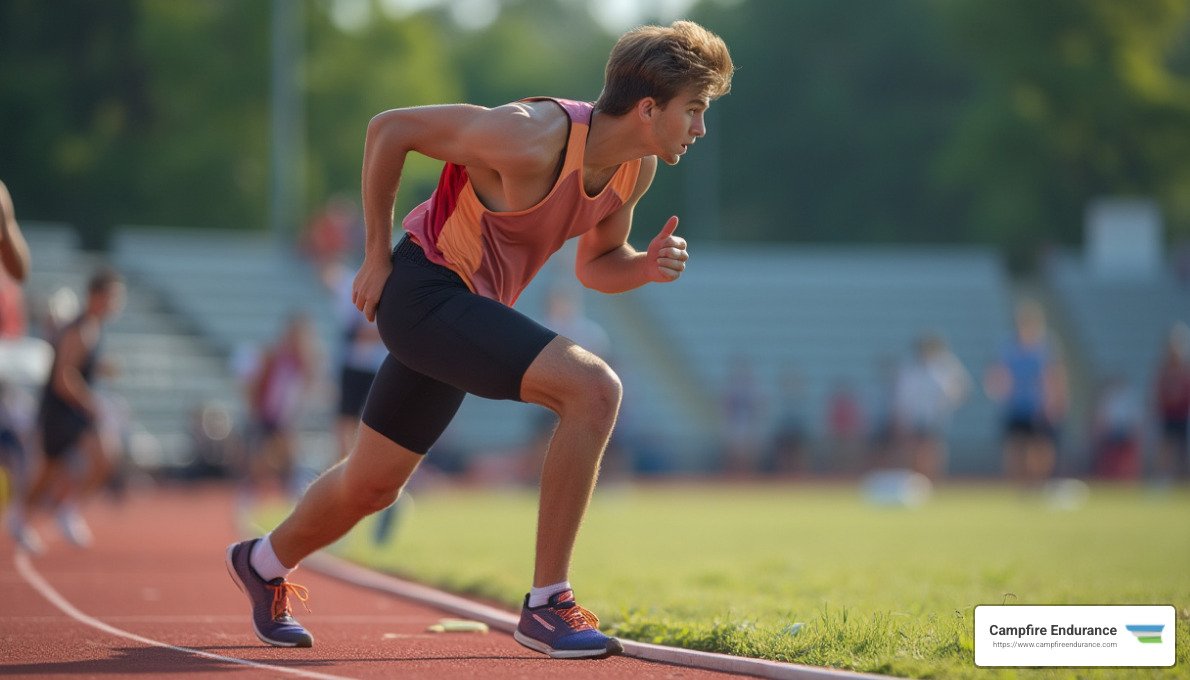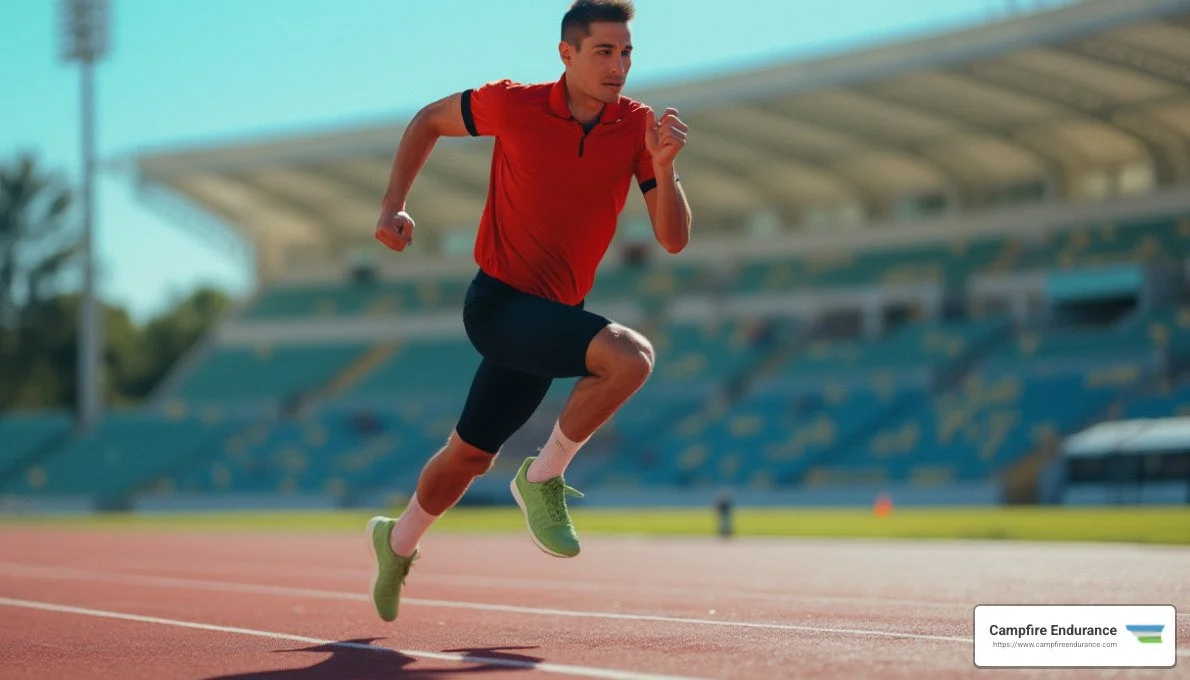Fuel Your Speed: Eating Right Before a Sprint
What to eat before a sprint race is a common question among athletes, especially those focused on maximizing performance. The quick answer: prioritize carbohydrates, which are key to fueling your muscles. Ideal pre-race snacks include fruits like bananas, energy bars, and low-fat yogurt. Stick to familiar foods to avoid any surprises on race day. Staying hydrated is equally essential, so be sure to drink water or a sports drink before you hit the track.
Carbohydrates are your energy allies, swiftly converting into glycogen—the fuel your muscles crave during those explosive sprints. This immediate energy source is crucial since, unlike endurance events, sprints rely on quick, intense bursts of power. Eating the right pre-race meals ensures your glycogen reserves are well-stocked, enabling your swiftest performance.
I’m Christopher Bagg, a seasoned endurance coach who has dabbled in everything from triathlons to cycling. My experience has taught me the significance of understanding what to eat before a sprint race for optimal performance and recovery.
Now, let’s explore the importance of pre-race nutrition.
Importance of Pre-Race Nutrition
When it comes to sprinting, glycogen stores are your secret weapon. Glycogen is the stored form of glucose, and it's what your muscles use for quick energy during a race. Think of it as your body's fuel reserve, ready to power those explosive starts and rapid finishes.
Muscle Fuel and Energy Metabolism
Sprinting is all about short, intense bursts of energy. Unlike endurance races that rely on the aerobic system, sprints depend on anaerobic metabolism. This means your body doesn't use oxygen to produce energy. Instead, it quickly converts glycogen into energy to fuel your muscles.
To ensure your muscles have the fuel they need, it's crucial to eat the right foods before a race. Carbohydrates play a starring role here. They are the primary source for glycogen, making them essential for sprinters.
Why Glycogen Stores Matter
During a sprint, your body taps into these glycogen stores to produce the energy needed for maximum speed. Without enough glycogen, your performance can drop. Studies show that glycogen stores can be depleted by about half with just three 30-second sprints, underscoring the importance of starting a race with full reserves.
Glycogen is not just about energy; it also affects how efficiently your body converts that energy. Proper nutrition before a race ensures your energy metabolism is at its peak, allowing you to sprint faster and recover quicker.
In the next section, we'll dive into what foods to eat before a sprint race to maximize your glycogen stores and boost your performance.
What to Eat Before a Sprint Race
Ideal Foods for Sprinting
When preparing for a sprint race, choosing the right foods is key. You want to focus on carbohydrates, which are crucial for filling up your glycogen stores. But remember, not all carbs are created equal. Aim for foods that are low in fat and low in fiber. This helps prevent any stomach discomfort during your race.
Here are some ideal food options:
Bananas: These are a great source of quick energy. They're easy on the stomach and packed with potassium, which helps prevent cramps.
Granola Bars: Opt for low-fat versions. They provide a balanced mix of carbs and a little protein, offering sustained energy.
Nut Butter: Spread a small amount on whole-grain toast or a banana. It's a tasty way to add a bit of protein and healthy fat without going overboard.
Timing Your Pre-Race Meal
Timing your pre-race meal is just as important as what you eat. Aim to eat 2-4 hours before your sprint. This window gives your body time to digest and convert the food into energy.
2-4 Hours Before the Race: This is the perfect time to eat a more substantial meal. Include complex carbs like whole-grain bread or pasta. Add a little protein, such as lean turkey or chicken, to keep you full.
1-2 Hours Before the Race: If you're feeling peckish, opt for a light snack. A banana or half a granola bar can give you a quick energy boost without weighing you down.
Eating too close to the race can lead to digestive issues, so it's important to plan your meals carefully. With the right foods and timing, you'll be fueled up and ready to sprint your best.
In the next section, we will explore nutritional strategies that can help sprinters optimize their performance and recovery.
Nutritional Strategies for Sprinters
Carbohydrates for Sprinters
Carbohydrates are your best friend when it comes to sprinting. They are the primary fuel source for anaerobic metabolism, which powers those explosive bursts of speed. When you sprint, your body taps into the glycogen stored in your muscles. That's why it's crucial to keep these stores full.
Pasta, rice, and bread are excellent choices for building up glycogen. These foods are high in carbohydrates, which quickly convert into energy. A meal with these options the night before a race can ensure your muscles are ready to perform.
Here's a simple breakdown of carbohydrate-rich foods:
Pasta: A classic choice. Opt for whole-grain varieties for added nutrients.
Rice: White rice is easy to digest and quickly replenishes glycogen.
Bread: Whole-grain bread provides complex carbs and fiber, which are great for energy.
Protein and Micronutrients
While carbs are the main focus, don't forget about lean proteins. They play a vital role in muscle recovery after intense workouts and races. Including proteins like chicken, turkey, or tofu in your diet helps repair muscle fibers and promotes strength.
In addition to proteins, vitamins and minerals are essential for overall health and performance. They aid in energy production and reduce fatigue. Key micronutrients include:
Vitamins: B vitamins are crucial for energy metabolism. Foods like eggs and dairy are good sources.
Minerals: Iron and magnesium support muscle function and recovery. Leafy greens and nuts are excellent choices.
Balancing carbohydrates, proteins, and micronutrients ensures that your body is well-prepared for both the demands of sprinting and the recovery process afterward.
In the next section, we'll answer some frequently asked questions about sprint nutrition to help you fine-tune your diet for peak performance.
Frequently Asked Questions about Sprint Nutrition
What is the best time to eat before a sprint?
Timing your pre-race meal is crucial for optimal performance. Aim to eat 2-4 hours before your sprint. This window allows your body enough time to digest and convert food into energy, without feeling sluggish or too full.
A meal during this period should focus on carbohydrates with some protein. Think whole-grain pasta or a turkey sandwich on wheat bread. If you're closer to the 2-hour mark, keep it light with a banana or a granola bar.
How can I avoid stomach discomfort during a sprint?
Stomach discomfort can ruin your race. To avoid this, steer clear of high-fat, spicy, or gassy foods. Foods like broccoli, beans, and spicy dishes can cause bloating or cramps.
Stick to familiar foods that you've tested during training. If you're unsure, a simple snack like a piece of fruit or a cereal bar is usually safe. Also, don't forget to hydrate—drink water to stay hydrated, but avoid overloading right before the race.
What should I eat if I have multiple sprint events in a day?
If you have several sprints in a day, it's important to refuel between events. Focus on easily digestible carbohydrates and some protein to maintain energy levels. Options like a sports drink, yogurt with fruit, or an energy bar can provide a quick energy boost.
Keep meals light and low in fiber to prevent digestive issues. After your last event, you can enjoy a more substantial meal to replenish your energy and support recovery.
By following these strategies, you can optimize your nutrition and stay energized throughout your sprint events.
Conclusion
At Campfire Endurance, we believe in more than just training athletes to run faster. We focus on personalized guidance and holistic development to help each athlete reach their full potential. Our approach goes beyond the track, encompassing nutrition, mental strength, and community support.
Sprint nutrition is a vital component of performance. By understanding what to eat before a sprint race, you can fuel your body with the right balance of carbohydrates and proteins, ensuring you have the energy and focus needed to excel. Our coaching emphasizes the importance of timing, helping you find the perfect window to eat and avoid any digestive issues on race day.
We tailor our coaching strategies to fit the unique needs of each athlete, offering insights that foster long-term growth and success. Whether you're preparing for a sprint or recovering from a race, our community supports you every step of the way.
Join us at Campfire Endurance to explore how personalized nutrition and training can lift your performance. Let's fuel your speed and help you achieve your athletic goals together!



